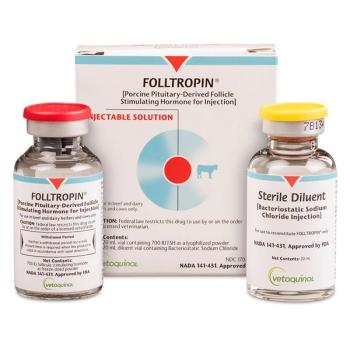
Maine DVMs battle vaccination backlash
Portland, Maine- Maine veterinarians are working to resolve a regulatory discrepancy that forces owners to abide by biennial rabies vaccine protocols and creates bad publicity for the profession.
Portland, Maine- Maine veterinarians are working to resolve a regulatory discrepancy that forces owners to abide by biennial rabies vaccine protocols and creates bad publicity for the profession.
The inconsistency stems from licensure laws that, due to a mandated renewal schedule, call for inoculation every two years rather than the national three-year standard. The controversy, fueled by activist owners who claim their dog's malignant skin tumor stems from over-vaccination, has sent Maine pet owners into a tailspin, officials say. Newspaper, television and radio spots report veterinarians favor over-vaccination, which isn't true, says Dr. Bill Bryant, president of the Maine Veterinary Medical Association (MVMA).
Bryant, who released an announcement that no scientific data links canine malignant tumors to rabies inoculation, is trying to spin media coverage in a positive light.
"My sense is that in this case, the regulations are driving science, and it should be the other way around," he says. "Because of state regulations involving licensing, most veterinarians in Maine have assumed we have a two-year requirement."
The publicity has become so heated, the Maine Bureau of Health, Department of Human Services issued a letter to practitioners addressing the unfavorable press, signed by State Veterinarian Donald Hoenig, VMD; State Public Health Veterinarian Robert Gholson, DVM, BCE; and State Animal Welfare Veterinarian Christine Fraser, DVM.
"We regret the negative publicity that our profession has recently received in the press, and any reflection that has had on you and your practice," the letter states. "The Bureau of Health and Department of Agriculture has always held the veterinarians of the state in the highest regard and has looked to them as partners in the protection of public health."
The issue remains convoluted, State Veterinarian Hoenig says, because timing vaccination with licensure is a numbers game.
"To get a dog licensed, our regulations require a rabies vaccine certificate showing the date of immunization must be within 365 days within primary immunization and 700 days for boosters," he says. "The confounding factor is that we license dogs in January. So you have to go to your town clerk sometime between October and Jan. 31 and license your dog for the coming calendar year."
That means if a licensed dog receives a booster on May 13, 2004, that three-year inoculation remains effective for 2005 and 2006. "But then when I go back in 2007, the vaccine is not dated within 730 days, so the town isn't going to license my dog," Hoenig says. "It's really kind of confusing."
That's why leading practitioners and the MVMA are gathering for a rabies-working group to resolve the issue. Bryant is issuing a public letter in response to the press in an attempt to ally client fears that rabies inoculation has a direct link to cancer formation. He's also reiterating the importance of rabies vaccines.
Newsletter
From exam room tips to practice management insights, get trusted veterinary news delivered straight to your inbox—subscribe to dvm360.






